We Were Made For This Moment
A reflection on the IPCC's Synthesis Report released March 20, 2023
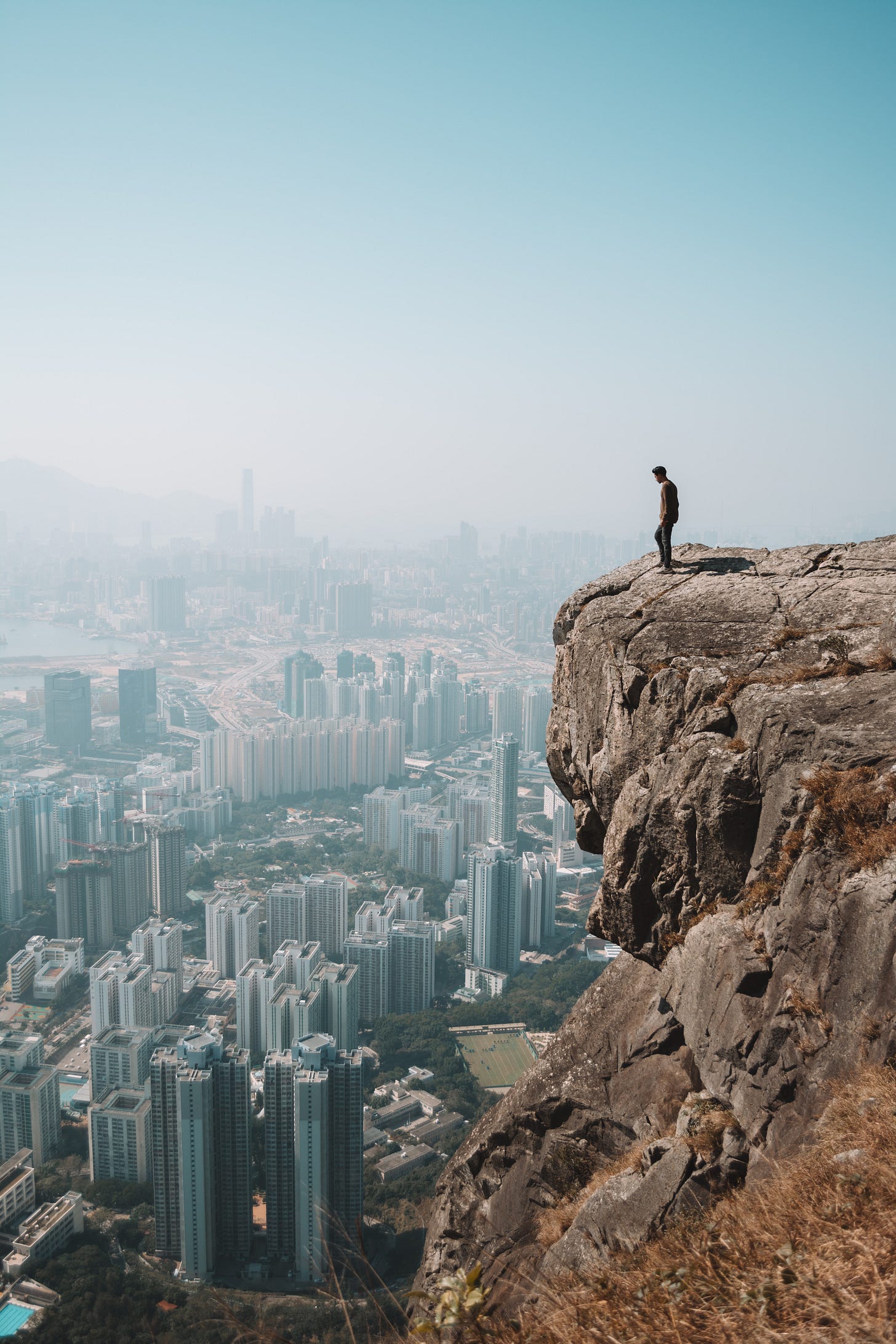
On March 20, 2023, the UN International Panel on Climate Change (IPCC) released the final section of its Sixth Assessment Report (AR6) on Climate Change. The AR6 is composed of a series of documents written by the various working groups that comprise the IPCC.1 If you recall, it was last April 2022 when they released the section on “Mitigation of Climate Change.” I wrote a blog post abut it, called “Finding Hope in the IPCC Report on Climate Change,” which you can access HERE.
We are in a climate and ecological crisis, and it’s all hands on deck... Subscribe to join a community of people of faith who care about climate action and find hope and encouragement at the same time!
What was released to the public last week is the Synthesis Report, a shorter document that summarizes the previous parts of AR6, and gives us a clear state of things in the world now, and possibilities in moving forward with respect to climate change. You can find it HERE. I encourage you to read it if you haven’t already. The diagrams and charts alone are quite informative.
The bottom line: It doesn’t tell us anything we didn’t already know, if we have been paying attention. It does, however, tell it in clear, stark terms:
“Human activities, principally through emissions of greenhouse gases, have unequivocally caused global warming, with global surface temperature reaching 1.1°C above 1850-1900 in 2011-2020. Global greenhouse gas emissions have continued to increase, with unequal historical and ongoing contributions arising from unsustainable energy use, land use and land-use change, lifestyles and patterns of consumption and production across regions, between and within countries, and among individuals.” (IPCC Synthesis Report, p. 4)
We are headed for no less than 1.5°C global heating in the near term. If current levels of greenhouse gas emissions continue on their current path, then we are headed for global heating of at least 3.2°C by the end of this century. The Report also states, clearly and unequivocally, that the regions of the world that are least responsible for greenhouse gas emissions are experiencing the worst of the current consequences of climate-change related patterns of weather, food shortages, biodiversity loss, sea-level rise, and much more. As the planet continues to heat up, these consequences will only worsen. The Report outlines how.
Reading the Report was hard for me. I had to take breaks in reading it, because the weight of it all lay heavy on my heart. In between, I was finishing up the book All We Can Save: Truth, Courage, and Solutions for the Climate Crisis, edited by Ayana Elizabeth Johnson and Katharine K. Wilkinson. It is a fantastic collection of essays and poetry from diverse women about responding to the climate crisis. As I was sitting heavily with the news about where we are headed without radical, transformative changes in how we live our lives, I read the following from the closing essay in that book, written by the editors. In “Onward,” they say:
“So where do we go from here? First, we take a breath. It’s a lot. And in some ways, we, humans, were not designed for a crisis this massive and all-encompassing. In other ways, we were made for this moment. What we do now is dream. From a foundation of science and community, we must imagine the future we want to live in, and the future we want to pass on, and every day do something to reel the dream closer to reality.”2
That line, “we were made for this moment,” struck me and stayed with me as I found the courage to keep reading. We were made for this moment. How?
I used to believe that if people just knew the details, they would take climate action. But the science, which hasn’t changed in this report from the other parts of the AR6, or from its previous reports (other than the fact that the projected risks and consequences of unabated fossil fuel burning are even higher than previously thought), is the same, and it is clear. Earnest academics like me, climate scientists, and other well-meaning people tend to think that the lack of climate action on the part of governments, industry, and individuals is because of a lack of information. I think of the phrase I use with my kids: “When we know better, we do better.” It sounds pretty naïve, though, when we discover that the fossil fuel industry has known for decades that burning oil and gas causes global heating.3
But, no. It is not, in general, the case of a lack of information on climate change. It is clear that many other factors are at play, including denial, cynicism, apathy, paralyzing fear, inertia, and old-fashioned greed. Indeed, in the Report itself, it is noted that barriers to climate change adaptation (taking measures to reduce the negative impact from global warming) include “lack of private sector and citizen engagement,” “lack of political commitment,” and a “low sense of urgency” (p. 9).
So, something else is going on in our world than not knowing the science. Something else is functioning. There is a deep resistance to changing the status quo, especially at the levels of government and the fossil fuel industry. There is a deep fear in having to change our ways, our fossil fuel-intensive ways, and what it will mean for our standards of living. There is, indeed, a deep fear for what our future holds, and the future for our children and grandchildren. All of this fear can be paralyzing, can paradoxically lead to inertia and resistance.
Yet, the Synthesis Report says, all is not lost. If we want to limit global warming to 1.5°C or 2°C at most, then we must move to “rapid and deep and, in most cases, immediate greenhouse gas emissions reductions in all sectors this decade” (p. 21)—rapid, deep, immediate reductions in burning fossil fuels and releasing methane into the atmosphere.
The end of this decade is 6 ½ years away; this means rapid, deep reductions now. Today.
We were made for this moment.
We can do it, as a global community. The Report also reminds us that the technology that we need to do so is already available. They have also analyzed the global financial picture and have determined that we have, globally, the money to make the changes. Most importantly, we have the capacity, technologically and financially, to make the rapid, deep and immediate reductions in ways that prioritize the needs of the most vulnerable and marginalized, honour Indigenous leadership and knowledge, are culturally sensitive, and lead to increased human rights, social justice, and ecosystem integrity and restoration around the world.
We were made for this moment. The technology is here; the money is here. The global knowledge and awareness are here. This moment contains all that we need to make a radical course correction.
Whatever we choose, the choices and actions we take now will have a global and local impact now and for thousands of years. “Continued emissions will further affect all major climate system components, and many changes will be irreversible on centennial to millennial time scales” (p. 25)
We were made for this moment. We stand at the precipice of not just years, not just decades, but centuries and millennia. This is a moment that echoes…there is a deep sense of the pivot that is needed, a pivot that we can do, together.
This is huge. Yet, there is hope, like I found in the previous part of the AR6 report. The hope lies in what is possible if we act. The hope lies in our capacity to come together and work collectively. Climate action will require every single one of us, and at every level: individual, social, municipal, provincial, federal, global. It will require us as citizens, as family members, as friends and neighbours, to draw on our relationships near and far. It will require us as people of faith to draw on our faith, on the teachings and practices that help us find meaning and courage, challenge and support.
Indeed, we were made for this moment! Throughout the Hebrew and Christian scriptures, we read stories of people called to speak, called to act, called to follow God. When Jesus spoke to fishermen Simon and Andrew, asking them to drop their nets and follow him, he was saying, “You were made for this moment” (Mark 1.16-20).
When God spoke to a shepherd named Moses out of a burning bush and called him to prophesy, God was saying, “You were made for this moment” (Exodus 3).
When Jesus called the tax collector Zacchaeus to come down from the tree so that they could visit, Jesus was saying, “You were made for this moment: (Luke 19.1-10)
And now, God is calling you. God is calling us. Let us take a breath. Let us dream the future, out of the science and community, as well as our faith and our love for the Earth. Dream the future, then take a step, a step today, then another tomorrow. Every day, we bring the dream closer to reality. We were made for this moment.
You can find the entire AR6 Report here: https://www.ipcc.ch/assessment-report/ar6/. Accessed March 28, 2023.
Ayana Elizabeth Johnson and Katharine K. Wilkinson, “Onward,” in All We Can Save: Truth, Courage, and Solutions for the Climate Crisis, ed. Ayana Elizabeth Johnson and Katharine K. Wilkinson (New York: One World, 2021), 373.
Georgina Rannard, “ExxonMobil: Oil giant predicted climate change in 1970s – scientists,” BBC News January 12, 2023 https://www.bbc.com/news/science-environment-64241994. Accessed March 28, 2023.
Call to Action
The news about the climate crisis can be overwhelming and discouraging; it is easy to feel that there is little we can do. This isn’t true; here is so much that we can do, concrete actions that we can take now, in response to God’s call upon us as people of faith. Here is one idea.
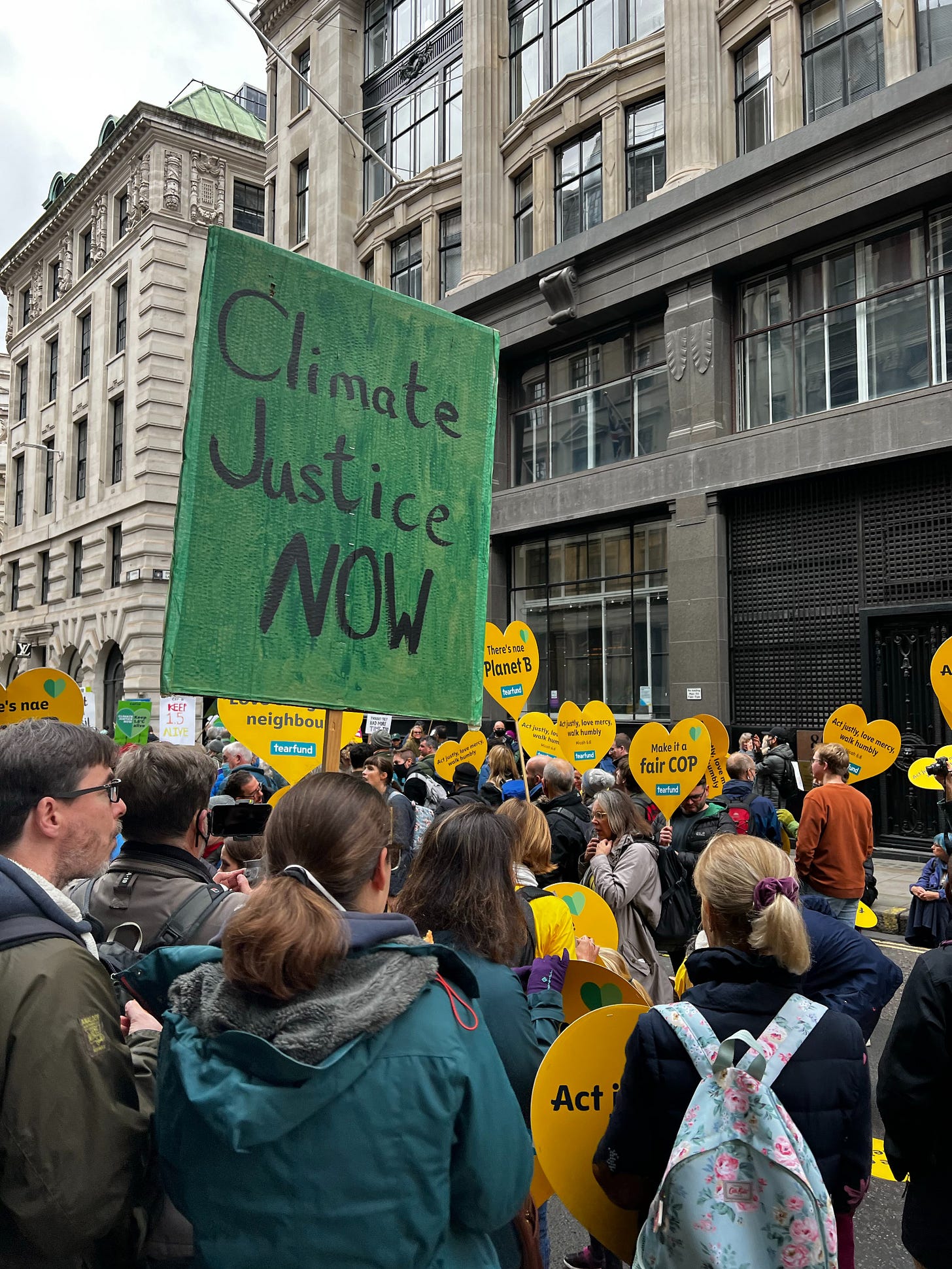
Donate $$$
Every Sunday in church, we take up an offering. That money is used for the ministry of the church and donating to causes supported by the United Church of Canada. Our minister always says words over the offering that remind us that, in addition to our funds, we give of our time and our talents. We are each called to give our treasures, money, as we are able, to volunteer our time, and offer up our particular gifts for the work of the church in God’s world.
Money is only one way to build the world we seek, but in a time when climate action seems complex and difficult, and when so many of us feel limited in what we can do (whether due to health issues, childcare responsibilities, etc.), donating to climate change organizations can go a long way.
I want to encourage you to consider giving money to a climate change organization that is taking more direct action these days, such as 350.org, Fridays for Future, Extinction Rebellion, individual climate activists, or others. And, I want you to consider giving more than you might normally, to stretch yourself beyond your usual limits for giving. Recognizing that each person’s financial situation is different, this can only be individually discerned. However, one thing to consider is this: What can I give, that is the money I would normally use to buy or consume something that I don’t really need? This will allow climate activists to take more concerted again on our behalf.
Discipleship is about acting in the world, and sometimes we are tempted to throw money at a problem instead of the deal with the problem itself. In suggesting donating money, I am not suggesting that doing so takes away the call that each of us has to take climate action. However, donating funds can be one important part of discipleship in action.
Earth Community in Pictures
The following pictures of spring come from subscriber Lynne Gardiner’s brother Alex, who lives in Niagara-on-the-Lake. He wrote to say:
“During our neighbourhood walks we also are hearing signs of spring with nuthatch, chickadee and sparrows singing songs, mourning doves, blue jays, robins, and crows.” How delightful! I haven’t seen a robin yet here in Ottawa…maybe on my walk this afternoon!
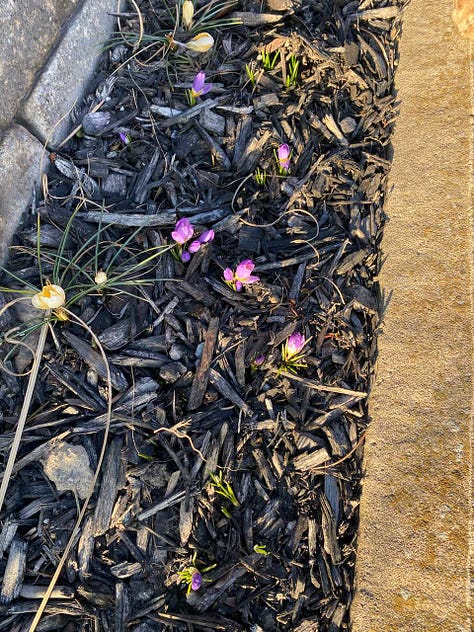
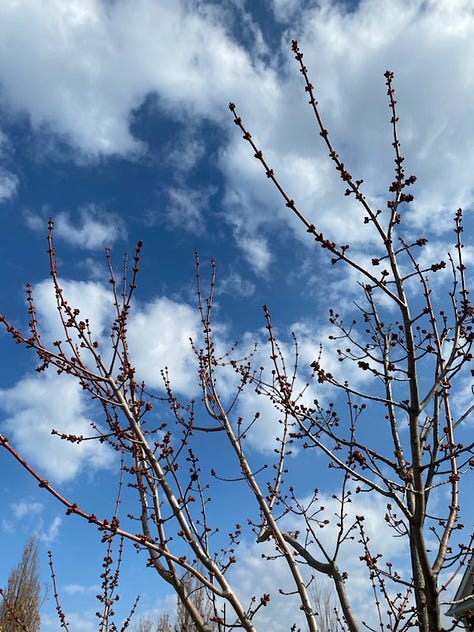
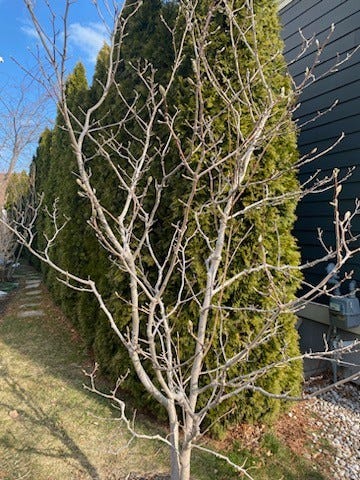
Do you have any pictures of spring that you would like me to post here (with or without your name)? Please send them to me at jessica@jessicahetherington.ca.
I’d Love To Hear From You
Please leave a comment below, send me an email, or find me on social media. I’d love to hear from you!








Jessica, thanks for your newsletters. It's definitely true that information alone is not translating into sufficient action. At the same time, the anxiety for people who are well informed can be a heavy burden.
Accordingly, my focus for the past 2 years has been on skill building and communication among actively engaged people. My way to do that was to build a Toastmasters club that meets on two Saturdays each month on Zoom.
This was a good way to keep building connections during the pandemic while allowing participants to build skills in more mindful and self-aware communication. It's also simply a good way for people to have fun and to feel good about having fun, which is very healthy.
Please share information about Green/Vert Toastmasters if you can, and plan to visit. It would be great to have you speak about the work of an eco-theologian.
More info online at https://greenTMvert.ca, including the Zoom link
April 1st at 11 AM we will have a special guest speaker:
Jake Cole "How clean is the air that you breathe?"
Guests are always invited to take part in "Table Topics", an impromptu speaking exercise on a "surprise" topic. The goal is to speak for at least one minute but not more than two minutes.
Thanks for everything you are doing!
James M.
Thanks for providing reflections on the IPCC report and a spiritual perspective. I have been looking out for guidance from spiritual leaders and groups like The Work That Reconnects about how to handle the ecological crisis and find support lacking. Thich Nhat Hanh talked briefly about a possible end of the world in less than 50 years: https://www.youtube.com/watch?v=EAoQQFV0yiY
I attended a Climate Justice Organizing HUB grief circle last night with people who were alternately hopeful and then heartbroken and despairing, terrified and angry. I talked about my at-times unbearable grief and anger related to the almost 70% decline in animals in the world since 1970, according to the World Wildlife Fund.
I hope we can help ourselves find the courage to face our somatic, emotional and spiritual responses to the slowly unfolding apocalpse and "imagine the future we want to live in, and the future we want to pass on, and every day do something to reel the dream closer to reality" (as you quote from “Onward”).